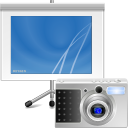KuickShow: Difference between revisions
Marked this version for translation |
moved category KDE3 out of translatable content |
||
| Line 67: | Line 67: | ||
<!--T:17--> | <!--T:17--> | ||
[[Category:Graphics]] | [[Category:Graphics]] | ||
</translate> | |||
[[Category:KDE3]] | [[Category:KDE3]] | ||
Revision as of 12:19, 10 June 2012
 |
A fast and convenient image viewer |
What is KuickShow?
KuickShow displays images using all the available space, without being wasted in bars or menus. It also has a smart automatic zooming that scales images according to its size. You can use the integrated file browser to choose images, or navigate through a folder with the mousewheel or the keyboard. It also has fullscreen view and slideshow, and supports a wide range of image formats.
Features
- Fast loading of big images.
- Powerful keyboard and mouse navigation.
- Easy zooming, mirroring, rotation, and adjustment of brightness, contrast and gamma.
- Full screen and slideshow views.
- Support for jpg, gif, tiff, png, bmp, psd, xpm, xbm, pbm and eim files.
Availability
Source release packages of KuickShow for KDE SC 4.x can be downloaded from
The source resides in the extragear repository in the "graphics/" sub directory, see here.
![]() The KDE 3 version of KuickShow is available in the KDE Graphics module, so it should be available in all distributions that package KDE 3.5 or earlier.
The KDE 3 version of KuickShow is available in the KDE Graphics module, so it should be available in all distributions that package KDE 3.5 or earlier.
Building to run with KDE SC 4.x
Before building KuickShow, you must make sure to have Imlib1 as well as its development headers installed.
If your distribution doesn't provide Imlib1 packages, download from here, unpack it to a temporary directory, enter the directory "imlib-1.9.15" and run
./configure
make
make install
This will build and install Imlib to /usr/local. Then grab the latest version of KuickShow, unpack it to a temporary directory, enter the directory "kuickshow-0.9.1" and run
cmake -DCMAKE_INSTALL_PREFIX=/usr
make
make install
You may choose different directory as prefix of course (e.g. choose the directory where your KDE4 is installed).
That's it, KuickShow is now installed and ready to display your images!
